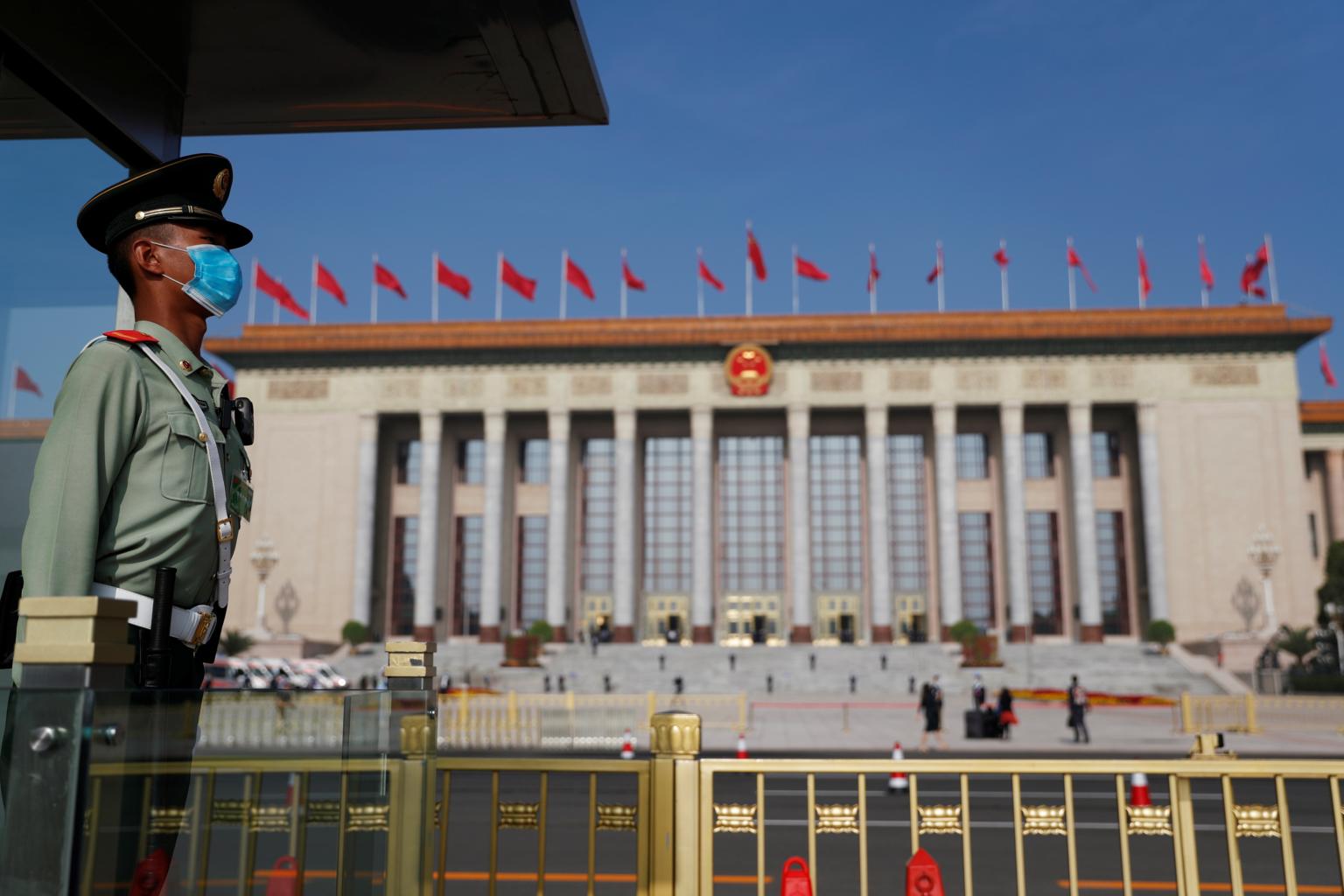NPC 2020: China drops GDP target this year amid uncertainties caused by coronavirus pandemic
Sign up now: Get insights on Asia's fast-moving developments

A paramilitary police officer stands guard outside the Great Hall of the People before the opening session of the National People's Congress on May 22, 2020.
PHOTO: REUTERS
Follow topic:
BEIJING - China has not set a gross domestic product (GDP) target this year, a move widely expected by economists.
In presenting his work report on Friday morning (May 22) at the Great Hall of the People, Premier Li Keqiang said a target was not given because of uncertainties caused by the coronavirus pandemic.
"This is because our country will face some factors that are difficult to predict in its development, due to the great uncertainty regarding the Covid-19 pandemic and the world economic and trade environment," he said.
"Not setting a specific target for economic growth will enable all of us to concentrate on ensuring stability on the six fronts and security in the six areas."
The six fronts refer to employment, the financial sector, foreign trade, foreign investment, domestic investment, and expectations.
The six areas refer to job security, stable living needs, operations of market entities, food and energy security, stable industrial and supply chains and the normal functioning of primary-level governments.
Before the coronavirus outbreak, economists had expected Beijing to set a target for its GDP growth of around 6 per cent for this year.
Last year, China's economy, battered by a fierce trade war with the US, grew 6.1 per cent - the country's slowest rate of growth since 1990.
Premier Li had announced at the opening of last year's Parliament session a growth target of between 6 per cent and 6.5 per cent.
Analysts had predicted that China would not set a GDP growth target this year, given the uncertainties in the economy and worries of another wave of outbreak. The economy contracted 6.8 per cent in the first three months of the year, the worst on record.
Among the main targets set out for the year is the creation of more than nine million new urban jobs, down from 11 million last year.
An urban unemployment rate target of around 6 per cent was also indicated, compared with 5.5 per cent last year.
Another target was an increase in consumer price index (CPI) of around 3.5 per cent.
Fiscal policy
Premier Li also vowed to pursue a "more proactive and impactful fiscal policy", setting China's deficit-to-GDP ratio at more than 3.6 per cent, past a long-standing red line of 3 per cent, and a deficit increase of 1 trillion yuan (S$199 billion) over last year.
The government pledged to issue 1 trillion yuan of government bonds.
At the same time, it will use monetary policy tools such as required reserve ratio reductions, interest rate cuts and re-lending to help businesses and stimulate the economy.
Other measures announced include further tax and fee cuts, support for flexible employment, and help for micro, small and medium businesses to access loans and keep afloat.
Premier Li took half the time he did last year to present the report, which was just 23 pages long, compared with last year's 43.
Chinese state television said it could be because the government wanted to keep the gathering of delegates and diplomats at the opening ceremony short, to reduce exposure because of Covid-19.
Some 5,000 delegates from around the country have gathered in Beijing for the annual parliamentary meetings, better known as Two Sessions, or lianghui.
Traditionally held in March, it was postponed this year because of the coronavirus outbreak and will be shortened from about 10 days to a week.
The country's top political advisory body, the Chinese People's Political Consultative Conference, began its session on Thursday.
Nearly 3,000 lawmakers meet to take stock of the government's work over the past year, pass laws and approve budgets at the National People's Congress meeting starting Friday.
Among proposals that the legislators will discuss is a draft resolution for a controversial national security law aimed at curbing subversive or terrorist activities and foreign interference in Hong Kong.
Parliamentarians are also expected to pass China's first civil code, which has been years in the making. The hefty 84-chapter Bill covers a large swathe: from personal data protection, property rights to sexual harassment.
On Friday, Premier Li vowed to press on with market reforms, boost domestic consumption and ramp up investment and building of new infrastructure such as next-generation information networks.
He also singled out Hubei province, where the first coronavirus cases were reported late last year, and promised a package of policies to get it back on track.
In addition, the government will improve its public health system and "resolutely prevent a resurgence of Covid-19", Mr Li said.
This includes building more medical facilities for epidemic control and treatment, and improving mechanisms for direct reporting and early warning of infectious diseases.

